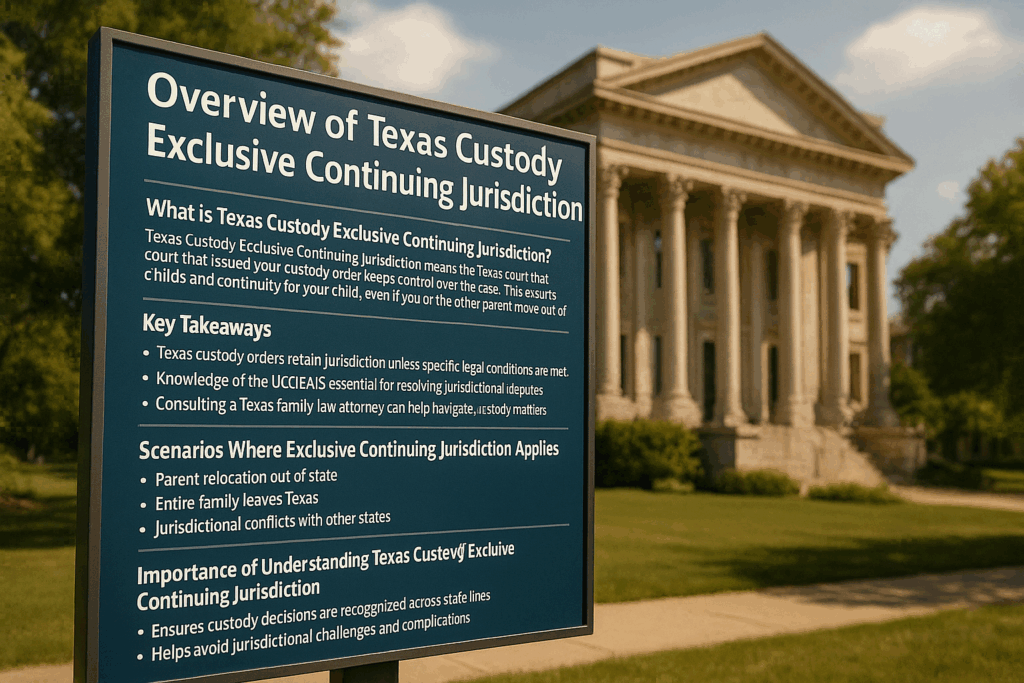
Ever feel like you need a law degree just to figure out who’s supposed to pick up your kid from school on Wednesday? If you’ve gone through a divorce—or you’re in the middle of one—you’ve probably already learned that child custody isn’t just about weekends and holidays. It’s about homework routines, after-school drop-offs, and making sure your child doesn’t fall behind just because their parents live in different zip codes. And that’s where Texas Custody Exclusive Continuing Jurisdiction comes into play—in one sentence, it means that the Texas court that issued your original custody order keeps legal control of the case, helping ensure consistency, predictability, and educational stability for your child.
In this blog, we’re diving into why this legal concept matters so much, especially when your child’s school year is already stressful enough without extra courtroom drama. You’ll learn how this rule works, what happens if a parent moves out of state, and how keeping your custody case under Texas jurisdiction can help protect your child’s academic success. We’ll also explore how Texas courts prioritize school stability in custody decisions, and share practical tips—like how to coordinate with teachers, support your child emotionally, and structure a parenting plan that keeps their education on track.
So if you’re looking for real answers to real custody questions—and want to do right by your child’s future—you’re in the right place. And if you ever need help navigating it all, The Law Office of Bryan Fagan, PLLC is just a call away.
Key Takeaways
- Texas Custody Exclusive Continuing Jurisdiction maintains that once a Texas court issues a custody order, it retains authority over the case unless specific legal conditions indicate otherwise.
- Jurisdictional disputes can arise when custody cases are initiated in new states, making knowledge of the Uniform Child Custody Jurisdiction and Enforcement Act (UCCJEA) essential for parents.
- Understanding jurisdictional rules and consulting a Texas family law attorney can help parents navigate custody matters effectively, ensuring legal compliance and avoiding potential conflicts.

Secure Your Child’s Future—Start Today
Don’t face custody challenges alone. Schedule your consultation now with a trusted Texas family law attorney and gain the clarity, support, and legal protection your family deserves.
What is Texas Custody Exclusive Continuing Jurisdiction?
Texas Custody Exclusive Continuing Jurisdiction, defined in Texas Family Code § 155.001, gives the original Texas court that issued a final custody order the ongoing authority to make future decisions in the case. This jurisdiction remains intact unless specific legal criteria are met—such as both parents and the child relocating and no longer maintaining significant ties to Texas. As long as Texas remains the child’s home state or a parent still lives there, the court retains control, ensuring consistency in legal rulings and protecting the child’s best interests.
This rule matters because it prevents legal confusion and forum shopping between states, which can derail the child’s academic stability and emotional well-being. Even if a parent moves out of Texas, that doesn’t automatically shift jurisdiction elsewhere. Instead, jurisdiction must be formally transferred under the Uniform Child Custody Jurisdiction and Enforcement Act (UCCJEA). Texas courts can continue to modify custody, conservatorship, visitation, and child support orders, maintaining a clear legal path for both parents.
For families navigating custody disputes or modifications, understanding where to file is just as important as what to file. Filing in the wrong court can cause delays or outright dismissals. To help avoid these issues, we recommend reviewing our guide on filing for custody in the correct Texas county for practical tips. Our firm also provides insight into Texas custody enforcement strategies to support families in maintaining stability.
At The Law Office of Bryan Fagan, PLLC, we believe families deserve legal solutions that prioritize children’s futures and minimize disruption. Our attorneys are here to help you understand how Texas Custody Exclusive Continuing Jurisdiction applies to your case and guide you through the legal process with clarity, compassion, and confidence.

Legal Standards for Exclusive Continuing Jurisdiction
The legal standards for exclusive continuing jurisdiction in Texas ensure that custody orders remain under the purview of the original court under the following conditions:
- One parent or the child resides in Texas.
- A Texas court retains exclusive jurisdiction over a custody case unless it determines that neither the child nor a parent has a significant connection to Texas.
- This jurisdiction is maintained through the Uniform Child Custody Jurisdiction and Enforcement Act (UCCJEA), which helps prevent jurisdictional conflicts between states.
The court may lose its exclusive continuing jurisdiction if an adoption is finalized in another court or if parents remarry and file a new suit affecting the parent-child relationship. However, jurisdiction may shift if a court in another state properly assumes jurisdiction under the UCCJEA.
Parents should be aware that jurisdiction is not automatically lost through relocation; formal legal procedures must confirm any changes for persons involved in a legal matter in a more appropriate forum where they presently reside to make an initial.
Jurisdictional disputes can arise when a custody case is initiated in a new state after a child has moved. In such instances, knowledge of the legal standards of exclusive continuing jurisdiction can help parents navigate these conflicts and ensure their initial child custody determination and custody orders remain enforceable.
Scenarios Where Exclusive Continuing Jurisdiction Applies
Exclusive continuing jurisdiction can be complex, especially when life circumstances change under certain circumstances. Real-world scenarios help illustrate how Texas courts maintain or transfer jurisdiction in various custody situations.
Whether a parent relocates out of state, the entire family leaves Texas, or there are jurisdictional conflicts with other states, understanding these scenarios can provide clarity and peace of mind.
Parent Relocation Out of State
When a parent moves out of Texas but seeks to modify a Texas custody order, the Texas courts may still retain jurisdiction if the child has not established a new home state. Even if one parent lives in another state, Texas may continue to hold the authority to make custody decisions.
For instance, if a parent relocates but Texas is deemed the child’s home state at the time of the initial custody determination, the Texas court maintains jurisdiction. This provision ensures that custody orders remain consistent and enforceable, preventing confusion and legal conflicts.
Entire Family Leaves Texas
When both parents and the child leave Texas, jurisdiction may shift depending on the circumstances of the move. If no one maintains a significant connection to Texas, the jurisdiction might be transferred to the new state.
The original Texas custody order may still be enforceable if one party remains in Texas or if the new state’s court recognizes the Texas final order.
Jurisdictional Conflicts with Other States
Jurisdictional conflicts can arise when a custody dispute occurs in a new state, creating a conflict over which state has the proper jurisdiction. The Uniform Child Custody Jurisdiction and Enforcement Act (UCCJEA) and the uniform act help resolve these conflicts by setting clear guidelines for determining the child’s home state and which court has authority.
Knowledge of these rules helps prevent legal complications and ensures that custody orders are recognized and enforceable across state lines.
Importance of Understanding Texas Custody Exclusive Continuing Jurisdiction
Understanding Texas Custody Exclusive Continuing Jurisdiction is key for any parent involved in a custody case. According to Texas Family Code § 155.001, the court that issues the original custody order keeps the authority to enforce or modify that order, unless specific legal conditions are met—like both parents and the child moving out of Texas. This continuity allows the court most familiar with your family’s history to make informed decisions that support your child’s stability, especially across state lines where conflicting rulings could otherwise arise.
Maintaining jurisdiction in the proper Texas court helps avoid delays, confusion, or even dismissals due to procedural missteps. When parents understand how this jurisdiction works, they can better anticipate what’s ahead and avoid unnecessary legal detours. If you’re unsure what to expect in a custody case, take a look at our Texas child custody case timeline for a helpful breakdown of the legal process from start to finish.
At The Law Office of Bryan Fagan, PLLC, our attorneys are dedicated to providing clarity and direction through every stage of your case. We also encourage you to read our guide on what to expect in a Texas custody case to understand how proper jurisdiction supports smoother outcomes. With the right support, you can focus on what matters most—your child’s future.

Filing Valid Modifications or Enforcement Motions
For parents seeking to change or enforce a custody order, understanding how Texas Custody Exclusive Continuing Jurisdiction works is critical. According to Texas Family Code § 155.001, the court that issued the original custody order typically retains the power to make future decisions, including modifications and enforcement, unless specific legal conditions are met. Even if one parent relocates out of state, Texas may still hold jurisdiction if the child continues to reside in Texas or has a strong connection to the state. Filing a modification or enforcement action without properly assessing jurisdiction can lead to delays, dismissal, or unwanted legal consequences.
That’s why working with an experienced Texas family law attorney is so important. A skilled attorney can evaluate whether Texas still holds jurisdiction, ensure your pleadings meet legal standards, and help you avoid costly mistakes. At our firm, we take pride in guiding families through these technical aspects of family law with both precision and care. If you’re considering modifying an existing order, visit our page on custody modifications in Texas to learn more about the process and what factors the court will consider.
The stakes in custody matters are high, especially when your child’s stability and schooling may be impacted. To explore how changes in your child’s life or your living situation might affect your custody arrangement, we also recommend reading our article on what to expect during a custody modification. The Law Office of Bryan Fagan, PLLC is committed to helping you move forward with confidence, clarity, and a plan that protects your child’s best interests every step of the way.
Avoiding Jurisdictional Challenges
Jurisdictional conflicts can arise when multiple states claim authority over custody decisions, often requiring navigation through the UCCJEA. Proactive knowledge of jurisdictional rules helps avoid delays in legal proceedings and the risk of having cases dismissed due to improper filing. Understanding these rules ensures that custody orders are recognized and enforced consistently, preventing unnecessary legal battles, including those involving emergency jurisdiction.
Awareness of jurisdictional parameters can prevent potential delays or dismissals of custody cases due to disputes over court authority. Such awareness is crucial for maintaining the integrity and enforceability of custody orders across state lines.
Compliance with State and Federal Laws
Adhering to both Texas state laws and federal regulations regarding custody is necessary to ensure that custody orders are legally enforceable. Non-compliance can lead to significant legal consequences, making it essential for parents to understand and follow the relevant laws. This compliance ensures that custody decisions are made in the best interest of the child and are recognized across different jurisdictions.
Knowledge of Texas Custody Exclusive Continuing Jurisdiction is critical for ensuring compliance with both state and federal custody laws. It helps parents navigate complex legal landscapes and avoid potential legal pitfalls.
Practical Guidance for Parents
Navigating a custody case can be overwhelming, especially when jurisdictional rules come into play. That’s why understanding Texas Custody Exclusive Continuing Jurisdiction, as established in Texas Family Code § 155.001, is so important. This statute ensures that once a Texas court issues a final custody order, it retains the authority to modify or enforce that order—unless specific legal requirements are met. For parents, this means that jurisdiction does not automatically shift if one party moves; instead, a formal legal process is required to determine whether Texas remains the appropriate forum.
Parents can better protect their legal rights—and their children—by keeping track of major changes like residency or school enrollment and by consulting with an attorney before assuming jurisdiction has shifted. These steps are especially critical in cases involving out-of-state moves, modifications, or enforcement actions. If you’re facing a new or ongoing custody matter, we recommend reviewing our top tips on how to prepare for your Texas custody suit for practical advice that can make the process smoother.
At The Law Office of Bryan Fagan, PLLC, we believe legal guidance should be both strategic and supportive. If you’d like to explore more about how courts assess custody and stability, our article on what to expect in a Texas child custody case offers deeper insight. When you’re armed with knowledge and a strong legal team, you can move forward with clarity and confidence, knowing you’re doing what’s best for your child’s future.

Consult with a Texas Family Law Attorney
When it comes to custody disputes that cross state lines, getting the legal details right from the beginning can save parents time, stress, and emotional toll down the road. One of the most critical concepts to understand is Texas Custody Exclusive Continuing Jurisdiction, defined under Texas Family Code § 155.001. This provision means that once a Texas court enters a final custody order, that court retains jurisdiction over the case unless a legal basis exists to transfer it. Filing custody matters in another state without confirming whether Texas still holds jurisdiction can lead to costly delays or even dismissal of your case.
That’s why parents are strongly encouraged to consult with a knowledgeable Texas family law attorney before taking action—especially if a relocation or multi-state issue is involved. Jurisdictional nuances under the Uniform Child Custody Jurisdiction and Enforcement Act (UCCJEA) can be tricky, and the guidance of a seasoned attorney is essential to ensure compliance and protect your child’s best interests. Our team takes pride in delivering that level of informed, compassionate legal support. To see the kind of dedication we bring to every client relationship, we invite you to meet Jessica Horace, one of our skilled professionals helping Texas families navigate custody cases with clarity and care.
Whether you’re starting a new case or modifying an existing order, working with a legal team that understands how Texas courts handle jurisdiction makes a meaningful difference. You can also learn more about the process and what to expect by reading our post on how Texas courts approach child custody cases. At The Law Office of Bryan Fagan, PLLC, we’re here to protect your future—and more importantly, your child’s.
Track Residency Changes and Legal Notices
Accurate records of residency changes are crucial for parents involved in custody matters to avoid jurisdictional conflicts. Parents should maintain detailed records of all residency changes, including dates and addresses, to ensure compliance with custody agreements and the child’s residence. Not documenting changes in residency and legal notices can complicate custody disputes and affect legal rights.
Accurate record-keeping provides a clear timeline and substantial evidence that can support a parent’s position in custody hearings.
Do Not Assume Jurisdiction Changes Without Court Determination
Jurisdiction in custody matters is a legal domain defined by the court and not something that can be changed by personal jurisdiction assumptions. A formal court initial determination is crucial in establishing whether subject matter jurisdiction has changed, as informal changes can lead to legal complications. Parents should not assume jurisdiction has changed without a formal court decision to avoid unnecessary legal disputes, as the court has the jurisdiction to make such determinations.
Parents should seek court intervention for any jurisdictional changes to protect their rights and interests in custody proceeding child custody matters.
Client Case Studies and Testimonials
At The Law Office of Bryan Fagan, PLLC, we’ve helped countless families successfully navigate the complexities of custody litigation through a strategic and compassionate approach. Whether the issue involves modifications, enforcement, or multi-state disputes, our team’s understanding of Texas Custody Exclusive Continuing Jurisdiction, as defined in Texas Family Code § 155.001, has made a significant difference in the lives of parents and children alike. By ensuring that the correct court retains authority over the case, we help families avoid jurisdictional confusion and protect the continuity their children need.
Our firm has guided families in communities across Texas, including those in La Vernia, where jurisdictional issues can arise when a parent relocates or when custody orders from different states come into play. We’ve seen firsthand how effective legal strategy rooted in jurisdictional clarity can result in outcomes that preserve stability for the child and peace of mind for the parent. Clients frequently express appreciation not just for the legal results, but for the personal support they receive during one of life’s most emotionally taxing experiences.
Many parents come to us feeling overwhelmed and uncertain about their rights, especially when a custody battle crosses county or state lines. By applying our deep knowledge of Texas Family Code and taking time to understand each client’s unique situation, we provide tailored legal solutions that get results. To read more about how we’ve helped families through these challenging situations, we encourage you to explore our insights on navigating custody modifications and enforcement. Our mission is—and always will be—to educate families and protect their futures, one case at a time.
Conclusion:
Custody issues don’t just live in courtrooms—they show up in morning routines, missed assignments, and the quiet moments when your child needs stability most. That’s why understanding something like Texas Custody Exclusive Continuing Jurisdiction isn’t just for legal professionals—it’s for parents who want to keep life as steady and supportive as possible during a time of change.
If today’s post gave you a little clarity, a few “aha” moments, or even a reason to breathe easier, then we’re doing what we set out to do—educate families and protect futures. Because here’s the truth: legal strategy matters, but so does your child’s report card, their sense of routine, and their ability to focus on being a kid. And when all those things work together? That’s when families start to feel whole again, even after a split.
If you’re staring down a custody question, worried about a move, or just need someone to help translate legalese into plain English, don’t go it alone. Our team at The Law Office of Bryan Fagan, PLLC is here to guide you—compassionately, strategically, and always with your child’s best interest at heart.
Give us a call at 281-810-9760 or schedule your free consultation online. Because when it comes to your child’s future, getting the legal side right makes all the difference.
And hey—custody might be complicated, but your next step doesn’t have to be. Let’s take it together.
Frequently Asked Questions – Texas Family Law
What is continuing exclusive jurisdiction in Texas Family Code?
Continuing exclusive jurisdiction means that once a Texas court makes a final custody determination, that same court retains the power to modify or enforce the order—unless certain legal conditions change, such as the child and both parents relocating from Texas.
What is the exclusive jurisdiction clause in Texas?
The exclusive jurisdiction clause in Texas ensures that once a court acquires jurisdiction over a matter, no other court can exercise jurisdiction over the same matter unless that first court loses its jurisdiction by operation of law or court order.
What is exclusive continuing jurisdiction?
Exclusive continuing jurisdiction refers to the legal authority retained by the original court that issued a custody or support order. This court alone has the power to modify or enforce the order until jurisdiction is legally transferred or terminated.
What is the jurisdiction of child custody in Texas?
In Texas, jurisdiction over child custody is governed by the Uniform Child Custody Jurisdiction and Enforcement Act (UCCJEA). Texas courts typically have jurisdiction if the child has lived in the state for at least six months prior to the case being filed.
What are examples of exclusive jurisdiction?
Examples of exclusive jurisdiction include bankruptcy cases (federal courts), probate matters (Texas probate courts), and original child custody determinations (family courts holding exclusive continuing jurisdiction).
What is Section 6.702 of the Texas Family Code?
Section 6.702 of the Texas Family Code mandates a 60-day waiting period from the date of filing before a divorce may be granted, unless specific exceptions such as family violence apply.
How is jurisdiction determined in Texas?
Jurisdiction in Texas is determined based on residency, the subject matter of the case, and compliance with statutory requirements. In child custody matters, jurisdiction is typically based on where the child has lived for the six months preceding the legal action.
How do you use exclusive jurisdiction in a sentence?
Example: “Because the Texas court issued the original custody order, it has exclusive jurisdiction to hear any future modification requests.”
What is the exclusive remedy defense in Texas?
The exclusive remedy defense in Texas is commonly invoked in workers’ compensation cases. It limits an employee’s ability to sue their employer for workplace injuries, asserting that workers’ compensation benefits are the only legal remedy available.
uccjea, divorce, custody jurisdiction, child custody, proceeding, protective orders, custody, domestic violence
Related Pages:
navigating texas custody orders, court of continuing jurisdiction texas, uccjea texas, texas custody exclusive continuing jurisdiction, texas custody venue, texas custody personal jurisdiction
Bryan Joseph Fagan is a respected child custody attorney based in Houston, Texas, with deep roots in Atascocita. As the first lawyer in a close-knit family that includes two adopted brothers, Bryan brings a personal connection to every family law case he handles. His early caregiving experience—supporting his grandmother through Alzheimer’s while attending night school at South Texas College of Law—shaped his unwavering commitment to helping families through life’s toughest transitions.
Now a father of three, Bryan’s real-world parenting perspective enhances his legal insight. He leads one of the most dynamic family law teams in Texas, with a particular focus on child custody, visitation rights, and protecting parental rights. From hotly contested custody battles to amicable co-parenting arrangements, Bryan and his team understand that at the heart of every case is a child who deserves stability, safety, and love.
As a certified member of the College of the State Bar of Texas, Bryan holds himself to the highest standards of legal excellence and continuing education. He is known for crafting innovative, effective legal strategies that reflect both the letter of the law and the emotional realities families face.
Bryan’s practice spans every aspect of Texas family law, including:
Custody and visitation disputes
Modifications and enforcement of existing orders
Complex divorce proceedings involving children
Adoption and paternity cases
Marital property agreements
Defense against false CPS allegations
Bryan is also an active member of the Houston Bar Association’s Family Law Section and participates in statewide legal groups committed to improving outcomes for Texas families. Whether negotiating a peaceful custody agreement or litigating in court to protect a child’s best interests, Bryan Joseph Fagan is a fierce advocate for parents and children across Texas.


